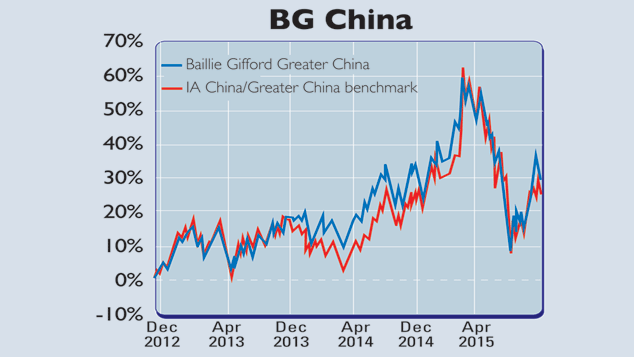Why I’m still buying China
China is going through lots of change, but the overall outlook is still positive. Rupert Foster looks at the best Chinese-focused funds to profit.

Get the latest financial news, insights and expert analysis from our award-winning MoneyWeek team, to help you understand what really matters when it comes to your finances.
You are now subscribed
Your newsletter sign-up was successful
Want to add more newsletters?

Twice daily
MoneyWeek
Get the latest financial news, insights and expert analysis from our award-winning MoneyWeek team, to help you understand what really matters when it comes to your finances.

Four times a week
Look After My Bills
Sign up to our free money-saving newsletter, filled with the latest news and expert advice to help you find the best tips and deals for managing your bills. Start saving today!
In June this year, I wrote in MoneyWeek that the mainland Chinese market was due a correction of at least 30%, and that it might be a good time to lock in any profits but that investors should spend the summer researching their favourite Chinese stocks "in advance of the next leg up". Looking back now, I think that what's happened over the summer very much supports my case.
China is going through lots of change some good, some bad and the authorities are capable of mis-managing the situation (as they did with their panicky reaction to the absolutely necessary stockmarket correction). But the overall trends are incredibly positive and most Western observers remain circumspect on the outlook at best a good sign from a contrarian point of view.
Overall the market has stabilised. The Shanghai index and the Hong Kong-listed China Index are up sharply from their lows, though still way off the highs we saw earlier this year. The margin balance (the amount of money being borrowed by traders to invest in stocks) on the Shanghai exchange is now backto US market levels (although globalbears might argue that this is still elevated).
MoneyWeek
Subscribe to MoneyWeek today and get your first six magazine issues absolutely FREE

Sign up to Money Morning
Don't miss the latest investment and personal finances news, market analysis, plus money-saving tips with our free twice-daily newsletter
Don't miss the latest investment and personal finances news, market analysis, plus money-saving tips with our free twice-daily newsletter
The renminbi after its initial "devaluation" of 3% has steadily strengthened so that it is now little changed from the point at which the "devaluation" was announced. In fact, the Chinese central bank has recently shifted the currency trading band higher because of this strengthening, blowing a gaping hole in the arguments made by China currency bears in August that the renminbi would collapse, exporting deflation across theglobe.
A promising focus on welfare
Meanwhile, reform continues the highlight of the recently announced 13th five-year plan was the abolition of the one-child policy, but a welcome surprise was a focus on the social safety net pensions, healthcare and so on. This will be very positive for consumption in the medium term, as people feel less pressure to save for their old age or healthcare spending.
Less welcome was the continued obsession with the level of GDP growth. This won't help China's shift from an investment-led economy to a consumption-led one. Artificial measures tohold growth at 6%-7% a year will just raise debt levels and hit returns on investment. I was also disappointed not to see more discussion of hukou (essentially permits controlling internal migration) and land reform, which would have given another boost to the urbanisation process.
But overall, the medium- and long-term investment case for China continues to strengthen. There will be a trend over the next few years towards including Chinese stocks in global indices, which will force passive funds and the majority of "active" managers to buy shares in these companies. On 12 November, for example, US-listed Chinese equity names such as internet giants Alibaba and Baidu were added to the MSCI index. Earnings expectations have fallen for next year, yet the market trades on a still-cheap looking 11 times.
The best funds to invest in now
I would opt for the Hong Kong and US combination, as those two markets are where the best Chinese companies are listed. I'm also a strong believer in China's internet sector. Like governments the world over, China's has been suckered into believing that monopolies and significant oligopolies are just a fact of online life. That's not great forconsumers but it is good for shareholdersin the likes of Alibaba which dominatesChinese online retail and Baidu, the largestshareholder in Ctrip, which controls over 80%of China's online travel market.

So I favour growth fund managers who investheavily in this area. This makes me leantowards the Baillie Gifford Greater ChinaFund. However, I am bullish on Japan too, so if you'd prefer a "one-size-fits-all" fund tocover developed and emerging Asia, then optfor Baillie Gifford Pacific, or Invesco Perpetual Pacific. Thereare tracker funds too, but Chinese equity indices tend to bedominated by the big banks, which I'm not so keen on whichis why I'd favour active fund management for China.
Rupert has been a pan-Asian equities fund manager for the last 20 years.
Get the latest financial news, insights and expert analysis from our award-winning MoneyWeek team, to help you understand what really matters when it comes to your finances.
Rupert is an investment strategist and adviser at J & C Foster, providing Asian, Consumer and Global Equities Strategy advice to a number of family offices and portfolio management organisations. He writes on Asia and Global Macroeconomics for a number of investment publications including MoneyWeek and HL Investment Times.
-
 Should you buy an active ETF?
Should you buy an active ETF?ETFs are often mischaracterised as passive products, but they can be a convenient way to add active management to your portfolio
-
 Power up your pension before 5 April – easy ways to save before the tax year end
Power up your pension before 5 April – easy ways to save before the tax year endWith the end of the tax year looming, pension savers currently have a window to review and maximise what’s going into their retirement funds – we look at how
